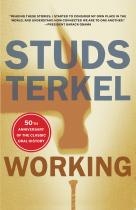Happy Birthday, Studs! Part I
By:
Josh Z.Wednesday, May 15, 2024

In the fall of 2008, NPR’s StoryCorps aired an episode with Studs Terkel. Like any of his interviews, it too begins with a question. “Whatever happened to the human voice?” For over five decades and across TV, radio, and a slew of books, Studs Terkel pursued the human voice. Each year, we mark his birthday but 2024 offers even more to celebrate in the guise of two particularly important anniversaries. It is the fiftieth anniversary of the seminal oral history Working, a book whose relevance and influence has only grown over the years since it was published. Ten years later, Terkel would publish “The Good War”, which would go on to win the Pulitzer Prize. Whether soldiers, laborers, artists, or survivors of the Great Depression, Terkel had an almost forensic interest in not just humans, but the human condition. With an eye for characters, Terkel’s interviews could elicit laughs as well as tears. They would illuminate those that were looked past and, in some cases, forgotten completely. This anniversary is not just a celebration. It is an opportunity to introduce Terkel and his classic works of oral history (all of which are still in print) to an entirely new generation, who is more familiar with people via screens than in person.
Terkel’s birthday was May 16. To celebrate his life and legacy, we’re going to take you on a Terkel tour throughout the rest of the year. Today, we’ll begin by looking at what other great writers and thinkers said about Studs before concluding with a couple of his own takes.
"A city speaks uninhibitedly through this book. . . . As informative as a social study and as fascinating as the dialogue of a play." —Nadine Gordimer on Division Street
"[Division Street] reports not only multitudes divided but the division in ourselves. . . . As exciting as a good novel."
—Nelson Algren
"An American treasure." —Cornel West
"Studs Terkel is more than a writer, he is a national resource." —John Kenneth Galbraith
"Hope Dies Last will live a long, long time in the memory of everyone who reads it. Like all of Studs Terkel’s work, this book glows with human warmth and an unquenchable passion for justice." —Barbara Ehrenreich
"By now [Studs Terkel] requires an adjective of his own." —Margaret Atwood, The New York Review of Books
"A powerful, original, indescribable, and incredible book. . . . Only an interviewer of genius, exploiting the tape recorder as hardly anyone else has done, could possibly have brought it forth." —Lewis Mumford on Working
"Nothing could tell our children’s children who and how and what we were the way Studs Terkel will. Is it possible the Great American novelist is Terkel?" —Murray Kempton
Studs had a philosophical bent to his thinking. Below are some of our favorite quotes which highlight Studs’s way of seeing the world.
From PBS:
"I think it’s realistic to have hope. One can be a perverse idealist and say the easiest thing: ‘I despair. The world’s no good.’ That’s a perverse idealist. It is practical to hope because the hope is for us to survive as a human species. That’s very realistic. Why are we born? We’re born eventually to die, of course. But what happens between the time we’re born, and we die? We’re born to live. One is a realist if one hopes."
"Hope Dies Last is an anthem to people who have hope, who always have been kind of a minority, who are called ‘activists.’ ‘Activist’ means what? Someone who does an act. In a democratic society, you’re supposed to be an activist; that is, you participate. It could be a letter written to an editor. It could be fighting for stoplights on a certain corner where kids cross. And it could be something for peace, or for civil rights, or for human rights. But once you become active in something, something happens to you. You get excited and suddenly you realize you count."
"We’re missing argument. We’re missing debate. We’re missing colloquy. We’re missing all sorts of things. Instead, we’re accepting."
"I’ve always felt, in all my books, that there’s a deep decency in the American people and a native intelligence—providing they have the facts, providing they have the information. The September 11 assault was horrendous. But there’s another assault that’s taking place. It’s an assault upon our intelligence. It’s an assault upon our sense of decency as well as upon our faiths too, I believe. We are the most powerful nation in the world, but we’re not the only nation in the world. We are not the only people in the world. We are an important people, the wealthiest, the most powerful and, to a great extent, generous. But we are part of the world."
"I hope for peace and sanity—it’s the same thing. I want a language that speaks the truth. I want people to talk to one another no matter what their difference of opinion might be. I want, of course, peace, grace, and beauty. How do you do that? You work for it."
STAY TUNED FOR MORE!
